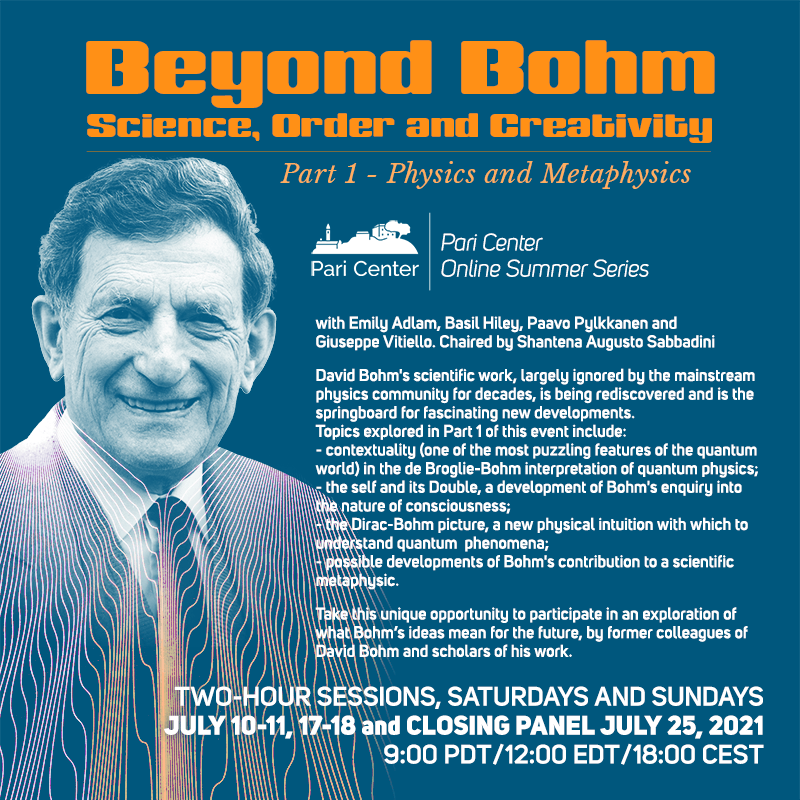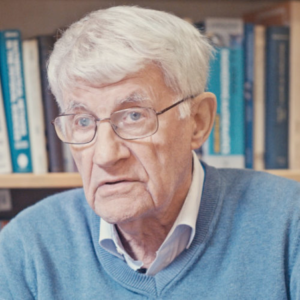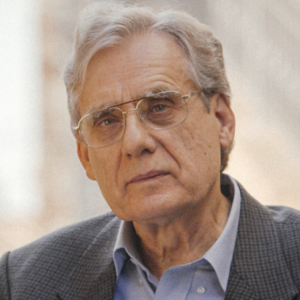Your cart is currently empty!

Closing Panel: Physics and Metaphysics
- This event has passed.
July 25, 2021 @ 6:00 pm – 8:00 pm CEST

Closing Panel: Physics and Metaphysics
with Emily Adlam, Basil Hiley, Shantena Augusto Sabbadini and David Schrum
Sunday July 25, 2021
9:00 PDT | 12:00 EDT | 17:00 BST | 18:00 CEST
2-hour session
If you are unable to attend the live session, the recording will be available.
The concluding panel of Part One of the Beyond Bohm event will examine work in progress in various areas related to Bohm’s thought.
The session will start with the panelists describing which developments of Bohm’s thought they consider most important for their work, for their life and for philosophy in general.
The discussion will then be open to the audience. Conversation in small groups will be used to elicit relevant question and comments.
To see the Full Beyond Bohm Series

Emily Adlam is a theoretical physicist and philosopher of physics specialising in quantum information and foundations. She studied physics and philosophy at Oxford and then received her PhD from the University of Cambridge in relativistic quantum information. She recently published a book, Quantum Foundations, as part of the Cambridge University Press Elements of Philosophy series.

Professor Basil Hiley, collaborator and colleague of David Bohm for over 30 years
Basil J. Hiley is a British quantum physicist and professor emeritus of the University of London. He received the Majorana Prize ‘Best Person in Physics’ in 2012. A long-time co-worker of David Bohm, Hiley is known for his work with Bohm on the implicate order and for his work on algebraic descriptions of quantum physics in terms of underlying symplectic and orthogonal Clifford algebras. Hiley co-authored the book The Undivided Universe with David Bohm, which is considered the main reference for Bohm’s interpretation of quantum theory.
The work of Bohm and Hiley has been characterized as primarily addressing the question ‘whether we can have an adequate conception of the reality of a quantum system, be this causal or be it stochastic or be it of any other nature’ and meeting the scientific challenge of providing a mathematical description of quantum systems that matches the idea of an implicate order.
In 1961 Hiley was appointed assistant lecturer at Birkbeck College, where Bohm had taken the chair of Theoretical Physics shortly before. Hiley wanted to investigate how physics could be based on a notion of process, and he found that David Bohm held similar ideas. He reports that during the seminars he held together with Roger Penrose he was particularly fascinated by John Wheeler’s ‘sum over three geometries’ ideas that he was using to quantize gravity.
Hiley worked with David Bohm for many years on fundamental problems of theoretical physics. Initially Bohm’s model of 1952 did not feature in their discussions; this changed when Hiley asked himself whether the ‘Einstein-Schrödinger equation,’ as Wheeler called it, might be found by studying the full implications of that model. They worked together closely for three decades. Together they wrote many publications, including the book The Undivided Universe: An Ontological Interpretation of Quantum Theory, published 1993, which is now considered the major reference for Bohm’s interpretation of quantum theory.
In 1995, Basil Hiley was appointed to the chair in physics at Birkbeck College at the University of London. He was awarded the 2012 Majorana Prize in the category The Best Person in Physics for the algebraic approach to quantum mechanics and furthermore in recognition of ‘his paramount importance as natural philosopher, his critical and open minded attitude towards the role of science in contemporary culture.’

Shantena Augusto Sabbadini graduated from the University of Milan in 1968 and was awarded his PhD in physics from the University of California in 1976. In Milan he researched the foundations of quantum physics, laying the base for what is currently known as the decoherence interpretation of quantum physics. At the University of California, he contributed to the theoretical work behind the first identification of a black hole, the X-ray source Cygnus X-1. In the 1990s he was scientific consultant for the Eranos Foundation, an East-West research center founded under the auspices of C.G. Jung in the 1930s. In that context he produced various translations and commentaries of Chinese classics in Italian and English, including the Yijing and the trilogy of Daoist classics, the Laozi, the Zhuangzi and the Liezi. From 2002 onwards he collaborated with F. David Peat running the Pari Center for New Learning and in 2017 he succeeded his friend and colleague as director of the center.
Shantena leads workshops and courses on the philosophical implications of quantum physics, on Daoism, and on using the Yijing as a tool for introspection. His most recent book in English, Pilgrimages to Emptiness: Rethinking Reality through Quantum Physics, was published by Pari Publishing in 2017.

David C. Schrum, PhD. Quantum theorist
David Schrum received his PhD in quantum theory from Queen’s University, Canada (1971), after which he spent two years in post-doctoral studies with David Bohm at Birkbeck College, London. At Birkbeck, Schrum entered the world of Bohm’s creative and subtle philosophical approaches to physics, and of his enquiry into the structure of consciousness and what may lie beyond. He was also introduced to his professor’s interest in the philosopher J. Krishnamurti. David Schrum continues engagement in these areas.
From 1974 until retirement he taught at Cambrian College, Sudbury, Canada. Present areas of focus are relativistic quantum theory derived from a new application of the quantum principle, and exploration and development of David Bohm dialogue as a process of shared enquiry into mind.
He is a board member of the Pari Center, Italy.
